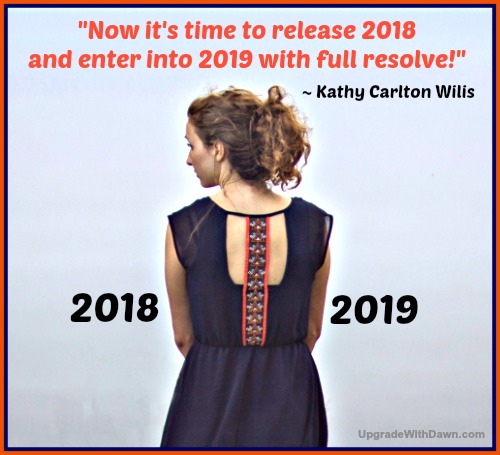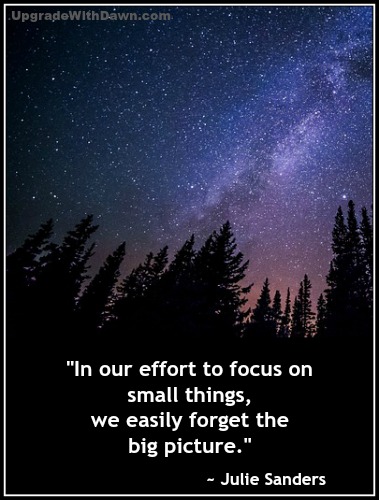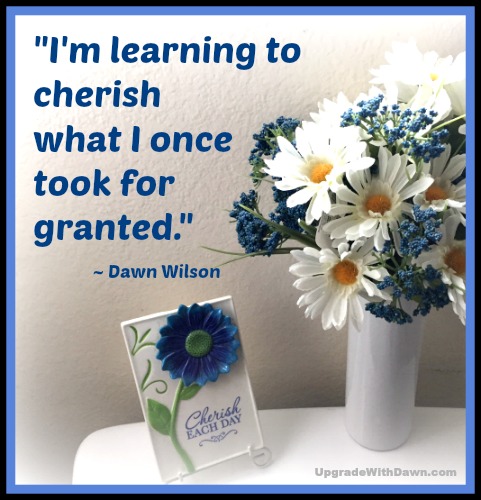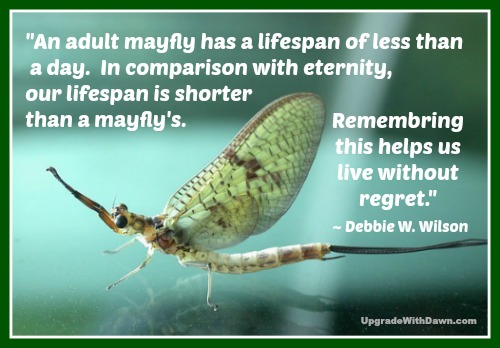Looking Back to Look Forward
Kathy Carlton Willis is a life trailblazer. As her bio reads, she "shines the light on what holds you back so you can grow." And so you can move forward. In this New Year UPGRADE she writes about two "looks"—the look backward and the look forward.
 Kathy says, “It’s not possible to move forward while looking back, but it’s also not possible to move forward without having first looked back.
Kathy says, “It’s not possible to move forward while looking back, but it’s also not possible to move forward without having first looked back.
"Looking back allows you the opportunity to leave it there. The good and the bad."
I (Dawn) love the opportunity Kathy gives us to prepare ourselves for our best year ever. Lots of wisdom here.
Kathy continues . . .
The past is only baggage that will weigh you down moving forward. It’s futile to expect passion to be enough for productivity in living out your purpose for 2019 until you properly put 2018 to bed.
Do you have any annual practices as you transition from the old year to the new year? Or would you like to start a new tradition this year?
It’s a great time to look back (to learn from the past) and to look forward (to set new goals).
Some choose to ask God to give them a focus word or phrase for the year. This practice allows you to have a main purpose or perspective as you navigate the next twelve months.
One way to prepare for the New Year is to:
- look back on the old year,
- address any unfinished business hanging on in your heart or mind,
- and then ask God to help you move forward, ready for what He has planned for you in 2019.
Steps to Looking Back Well
1. Be honest with yourself.
Many women tend to downplay the good things and magnify the bad.
2. Identify the positive highlights of the year.
Why do they stand out in your mind? What was your part in the outcome? How did you see God at work in the circumstance, or in your heart and mind?
3. Let go of the disappointments of the year.
What do you regret? How were you let down? How did something negative impact your year?
What can you do to move past it?
4. Repent of anything left unconfessed from 2018.
- Look upon your sinful choices with remorse and learn from them.
- Consider ways to choose godly options next time.
- Accept God’s forgiveness and ask God to change any lingering tendencies that might cause you to give in to unholy thoughts or actions in the future.
5. Recall the hard times you endured that had good outcomes.
Thank God for equipping you with the endurance needed to persevere.
As you say goodbye to 2018 and say hello to 2019, take some time to grieve the losses of the year and celebrate the victories.
Do something monumental and memorable to mark this moment. This prepares you to move forward.
“Remember the wonders he has performed, his miracles, and the rulings he has given” (1 Chronicles 16:12 NLT.
Now it’s time to release 2018 and enter into 2019 with full resolve!
“No, dear brothers and sisters, I have not achieved it, but I focus on this one thing: Forgetting the past and looking forward to what lies ahead, I press on to reach the end of the race and receive the heavenly prize for which God, through Christ Jesus, is calling us” (Philippians 3:13-14 NLT).
Steps to Looking Forward Willingly
1. Decide what to do about unfinished projects.
What was left unfinished in 2018?
How do you plan to make room for it in 2019? Or is this a goal that you need to let go?
2. Evaluate what new thing God is impressing on you as you pray for direction in the new year.
How will you incorporate that into your plan?
3. Identify distractions, doubts and disabilities.
What limitations might impair you, moving forward?
How can you set up a plan to work around these concerns?
4. Work within your heart-core passion.
What project excites you? How can you make more room in your life for it?
5. Reserve more margin or white space in your life.
How will this refuel you?
What might you do to guard against draining to-dos threatening to crowd this space?
6. Ask God to show you the goals He has for your 2019.
- What will help you grow spiritually, personally, and professionally?
- What will benefit your family and friends?
- What will put you in a place of service and ministry?
- And mostly, what will bring glory to God?
The blank 2019 calendar represents you emptied out and ready to be filled up with God and His goals for you.
How will you fill your calendar (and your life) this year?
God’s Grin Gal, Kathy Carlton Willis, shines the light on what holds you back so you can grow. She’s
 a speaker and author with over a thousand articles online and in print, as well as her Bible study, Grin with Grace; and she is featured on CBN. She and her husband Russ live in Texas with their adorable Boston Terrier, Hettie.
a speaker and author with over a thousand articles online and in print, as well as her Bible study, Grin with Grace; and she is featured on CBN. She and her husband Russ live in Texas with their adorable Boston Terrier, Hettie.
Graphic Adapted, courtesy of JakeMelara at Unsplash.
 1 Comment → Posted on
1 Comment → Posted on  Thursday, January 3, 2019 at 9:00AM
Thursday, January 3, 2019 at 9:00AM  Celebrate Victories,
Celebrate Victories,  Disappointments,
Disappointments,  Goals,
Goals,  Grieve the Losses,
Grieve the Losses,  Learn from mistakes,
Learn from mistakes,  Learn from the Past,
Learn from the Past,  Let it go,
Let it go,  Looking Back,
Looking Back,  Looking Forward,
Looking Forward,  New Year,
New Year,  New Year's,
New Year's,  Persevere Upgrade Your Life
Persevere Upgrade Your Life  Goals,
Goals,  New Year,
New Year,  Perspective
Perspective 













